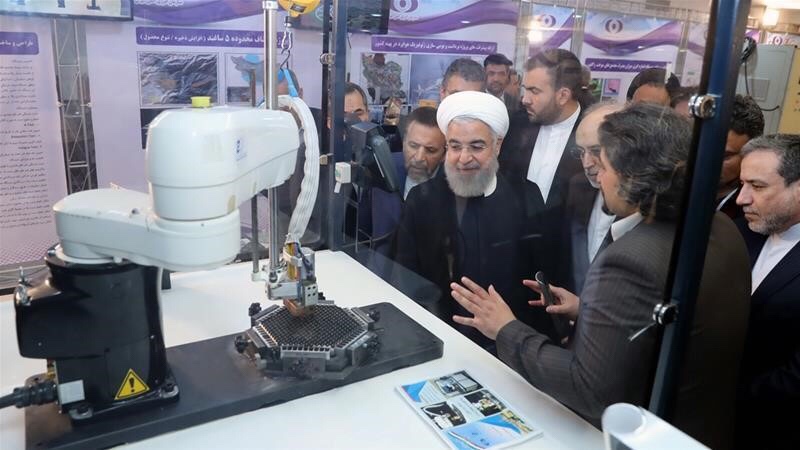 Iran Threatens To Restart Nuclear Enrichment Program
Iran Threatens To Restart Nuclear Enrichment ProgramBy ZeroHedge - Apr 11, 2018, 3:00 PM CDT
Iran is threatening to restart its controversial nuclear enrichment program, as the head of the Islamic Republic's Atomic Energy Organization (AEOI) revealed on Sunday that they have maintained the ability to quickly restart the full-scale enrichment of uranium "within 4 days," reports FARS news.
"If senior Islamic Republic officials issue an order to resume the 20 percent enrichment, we can do it in Fordo within 4 days," said Ali Akbar Salehi, head of the AEOI - referring to the Fordo nuclear facility in northern Iran. Of note - 20 percent enrichment is considered above the required level for nuclear energy production, however it is still well below the 80-90 percent required for a nuclear weapon.
Salehi said his statement should be seen as a warning not to discard the nuclear deal - and revealed that Iran had made "more extensive progress in other parts of its nuclear activities" which "go beyond the previous levels" according to FARS.
Meanwhile, in a Monday speech at the "National Atomic Energy Day," Iranian President Hassan Rouhani declared that Iran's nuclear industry is moving along "faster than before."
"I want to clearly say to the Iranian nation that our nuclear industry is moving faster than before with more energy, accuracy and more exact calculation," the Iranian leader said, speaking from Tehran. Rouhani was quoted as saying Iran needs "both hard and soft power," while pursuing "constructive engagement" with the rest of the world.
Under the 2015 agreement spearheaded by the Obama administration, Iran promised to significantly scale back its nuclear enrichment programs and give up pursuit of nuclear weapons - however it is still allowed to develop civilian nuclear technology, including energy production and scientific research.
"We don’t have any problems technically. We were moving normally in the past but if we want to soar up, we can ascend to go up the ladder and develop 100,000 SWUs (of enrichment capacity) in one and a half years and change the heart of the (Arak heavy water) reactor too," said AEOI Spokesman Behrouz Kamalvandi.
The disclosure by Iran comes at a tenuous time for the nuclear deal, as the Trump administration has been pressuring international allies to agree to a new set of restrictions which would further constrain the country's ability to conduct ongoing nuclear research, as well as its ballistic missile program.
Mark Dubowitz, a nuclear expert who has advised the White House and Congress on the Iran issue, told the Free Beacon that Iran's latest enrichment threats expose critical flaws in the Iran deal that the Trump administration is seeking to address.
Iran's "threats confirm that the Iranian regime never gave up on its atomic weapon ambitions," said Dubowitz, CEO of the Foundation for Defense of Democracies, a Washington-based think-tank.
The nuclear deal, also known as the Joint Comprehensive Plan of Action, or JCPOA, "merely hit the pause button temporarily on those aspects of Iran’s nuclear program that it had already perfected — and, as [Salehi's] threats underscore, could be easily restarted—while leaving Tehran with the time and space to develop technologies that it hadn't perfected such as advanced centrifuges and missiles," Dubowitz said. "His threats reveal what many deal skeptics have long argued: unless the JCPOA is fixed, Iran has pathways to dozens of nuclear-tipped missiles capable of striking U.S. forces, U.S. allies, and eventually the U.S. homeland."
Trump administration insiders who spoke to the Free Beacon about the matter warned that Iran’s threats can be backed up with action should the Islamic Republic decide to abandon the deal and buck Trump. -Free Beacon
"This is exactly what President Trump means when he says the Iran deal is the worst agreement ever negotiated," said one Republican foreign policy adviser to the Free Republic.
"The Obama administration gave away the store, literally sending Iran billions and billions of dollars, but the deal left Iran with the ability to reverse their concessions in a couple of days," the source said. "We gave away too much for too little, and every day the deal stays in place Iran gets more and more benefits from sanctions relief. No wonder the president is leaning toward getting us out."
In January, President Trump announced that he will be waiving US sanctions against Iran for the "last time," adding that if his demands are not met within four months, the U.S. will withdraw from the Iran nuclear deal - possibly before a May 12 deadline.
The May 12 deadline represents an opportunity for Trump to pull the U.S. out of another international deal. He has already abandoned the Paris climate accord and the Trans-Pacific Partnership, a 12-nation trade deal. He wants to renegotiate the North American Free Trade Agreement, a 24-year-old trade pact with Canada and Mexico. -USA Today
It's widely expected that Iran will resume its enrichment of uranium as soon as the deal collapses, while the U.S. formally excludes Iran from SWIFT - again - curbing the amount of oil Iran can export by approximately 1 million barrels daily, in the process sending the price of crude even higher in the summer months.
By Zerohedge
No comments:
Post a Comment